Can Squirrels Eat Peanut Butter? Discover the Nutty Facts!
As a popular snack enjoyed by humans worldwide, peanut butter may seem like a tasty treat for squirrels too. However, before you share your PB&J sandwich with a furry friend, it’s essential to understand what foods are safe for squirrels to consume.
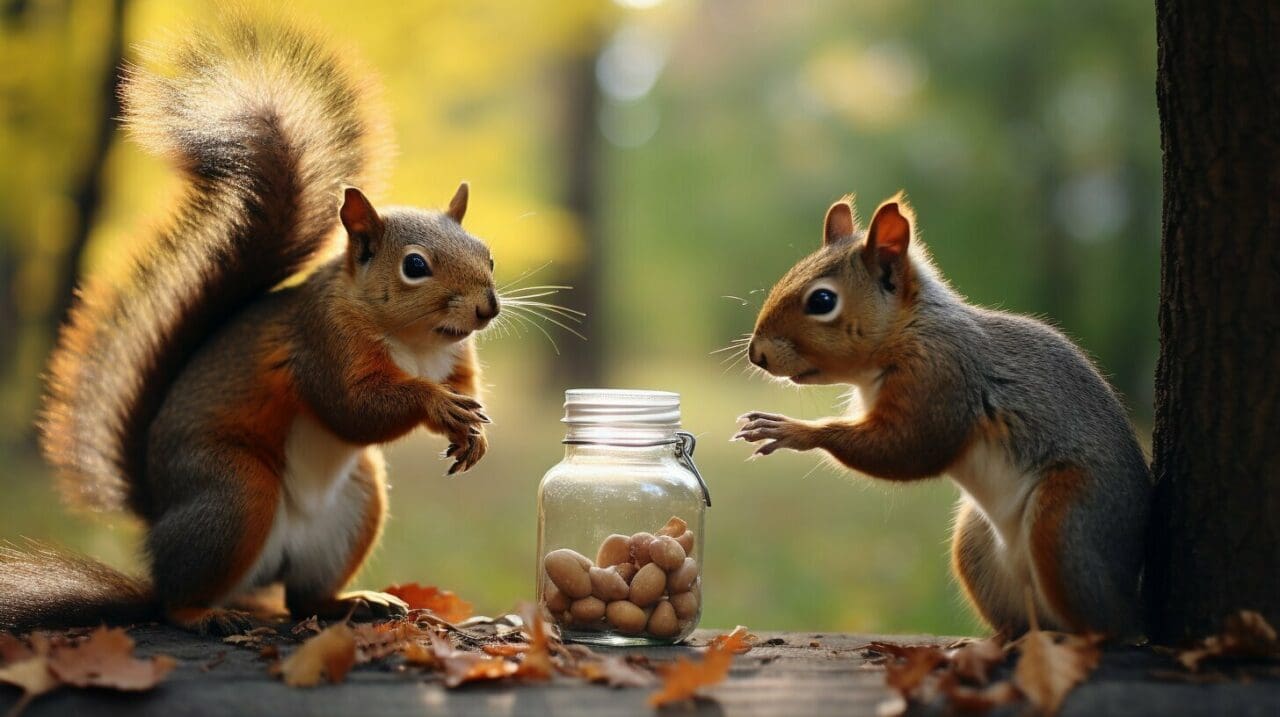
Squirrels have a varied diet that includes nuts, seeds, fruits, and vegetables. While they may enjoy trying different foods, not all items are suitable for their nutritional needs. As a responsible caregiver or wildlife enthusiast, it’s important to prioritize the health and well-being of these furry creatures.
So the question remains – can squirrels eat peanut butter? The following sections will explore the potential benefits, risks, and precautions of feeding peanut butter to squirrels, as well as alternative food options that are safe and healthy.
Key Takeaways:
- Peanut butter is a popular snack enjoyed by humans but may not be suitable for squirrels’ nutritional needs.
- Squirrels have a varied diet that includes nuts, seeds, fruits, and vegetables.
- It’s important to prioritize the health and well-being of squirrels when offering them food.
- The following sections will explore the potential benefits, risks, and precautions of feeding peanut butter to squirrels, as well as alternative food options that are safe and healthy.
Understanding the Squirrel Diet
Squirrels are known for being nut-lovers, but their diet is more varied than you might think. In addition to nuts, squirrels also enjoy seeds, fruits, and vegetables.
Their diet typically includes acorns, hickory nuts, walnuts, and pecans. They also enjoy sunflower seeds, pumpkin seeds, and pine cones. When it comes to fruits and vegetables, squirrels often feed on berries, apples, corn, and mushrooms.
It’s essential to provide squirrels with a balanced diet to ensure they receive all the necessary nutrients. While squirrels have a preference for certain types of food, they also consume a variety of items to maintain their health and well-being.
Understanding the Squirrel Diet
| Preferred Foods: | Additional Foods: |
|---|---|
|
|
Providing a varied diet that mimics their natural food sources is crucial for squirrels’ long-term health. Additionally, feeding squirrels foods that are not suitable for their diet can lead to health problems.
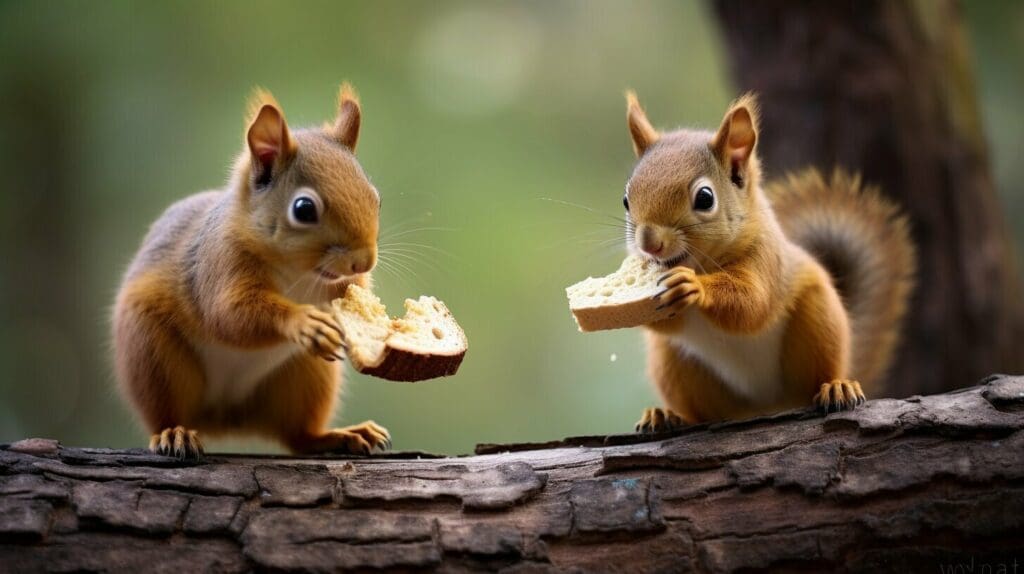
Is Peanut Butter Safe for Squirrels?
Many people love to snack on peanut butter, but can squirrels safely enjoy this popular nutty spread as well? While squirrels have a varied diet, it is essential to understand which foods are safe for them to maintain their health.
Peanut butter is high in fat and protein, which can be beneficial for squirrels, especially during the winter months when food sources are scarce. However, it is crucial to ensure that squirrels consume peanut butter in moderation to avoid any potential health risks.
While peanut butter can be a tasty treat for squirrels, it is important to be aware of any potential toxicity or health concerns.
| Risks | Precautions |
|---|---|
| Peanut butter may contain additives like sugar or salt, which can be harmful to squirrels. | Choose natural peanut butter or make your own to avoid additives. |
| Peanut butter is high in calories and fat, which can lead to obesity and other health issues. | Feed peanut butter in small amounts as a treat or supplement to their regular diet. |
| Squirrels may have allergic reactions to peanuts or other ingredients in peanut butter. | Monitor squirrels for any adverse reactions, and discontinue feeding peanut butter if necessary. |
Feeding wild squirrels, in general, comes with risks. It is essential to consult with wildlife experts or local authorities for specific guidelines on feeding squirrels in your area.
While peanut butter can be a delicious snack for squirrels, it is crucial to prioritize a balanced and natural diet to promote their overall health.
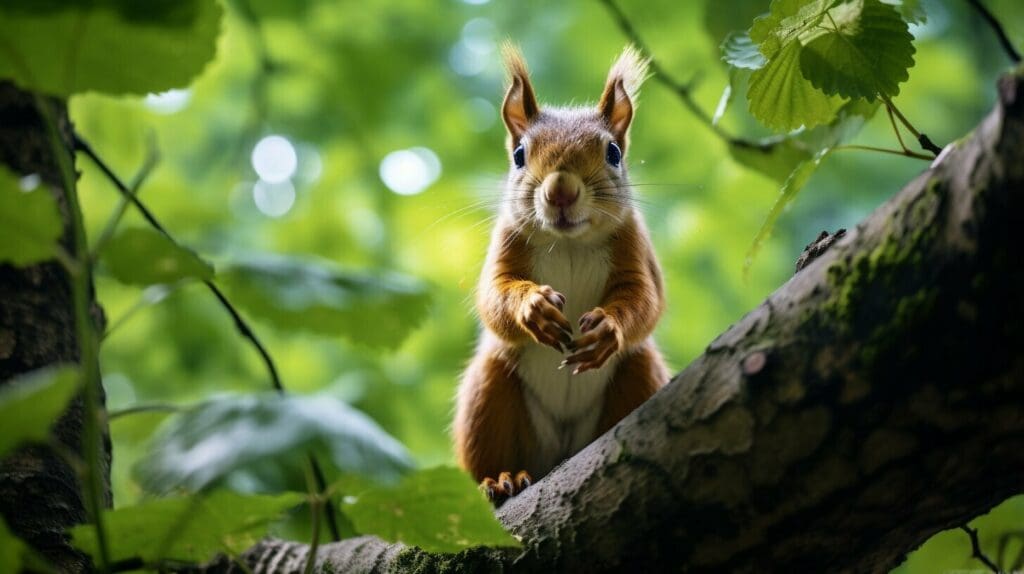
Benefits of Peanut Butter for Squirrels
While there are some potential risks associated with feeding squirrels peanut butter, there are also some potential benefits to consider. Peanut butter is high in energy and contains essential nutrients such as protein, fiber, and healthy fats. In moderation, peanut butter can be a tasty treat or supplement to a squirrel’s regular diet.
It is important to note that not all peanut butter is created equal. Avoid brands that contain additives such as sugar or salt, as these can be harmful to squirrels. Choose natural peanut butter that is made from 100% peanuts.
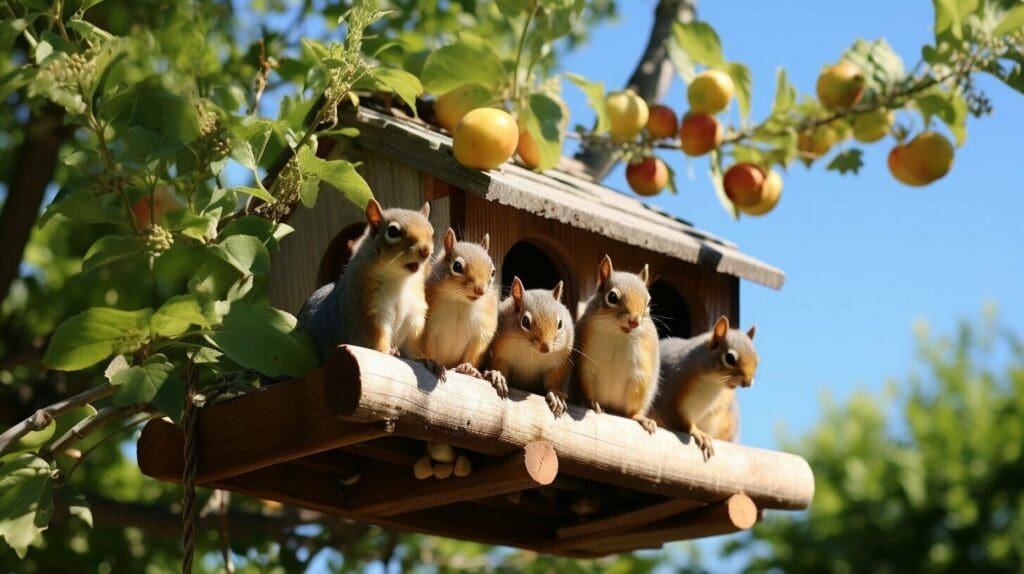
When introducing peanut butter to a squirrel’s diet, it is important to do so gradually and in moderation. Too much peanut butter can lead to obesity and digestive issues. Offer small amounts of peanut butter as a treat or occasional supplement to their regular diet.
It is also important to consider the potential risks associated with feeding wild squirrels. Always consult with wildlife experts or local authorities for specific guidelines on feeding wild squirrels. In some cases, it may be best to avoid feeding wild squirrels altogether.
Risks and Precautions
While peanut butter can be a tasty treat for squirrels, there are some risks involved with feeding them this food. One of the main concerns is the high fat content of peanuts, which can lead to obesity if squirrels consume too much.
Additionally, some squirrels may have digestive issues or even allergic reactions to peanut butter. It is crucial to avoid giving squirrels peanut butter that contains additives like sugar or salt, as these can be harmful to their health.
If you’re considering feeding squirrels peanut butter, it’s important to do so in moderation and with caution. Start by offering a small amount and monitor how the squirrels react. If they show signs of digestive distress or other issues, it’s best to stop feeding them peanut butter altogether.
It’s also worth noting that while it may seem harmless, feeding wild squirrels is not always a good idea. In some areas, it is even illegal to feed wild animals. If you do choose to feed squirrels, it’s important to follow local guidelines and consult with wildlife experts to ensure that you’re doing so safely and responsibly.
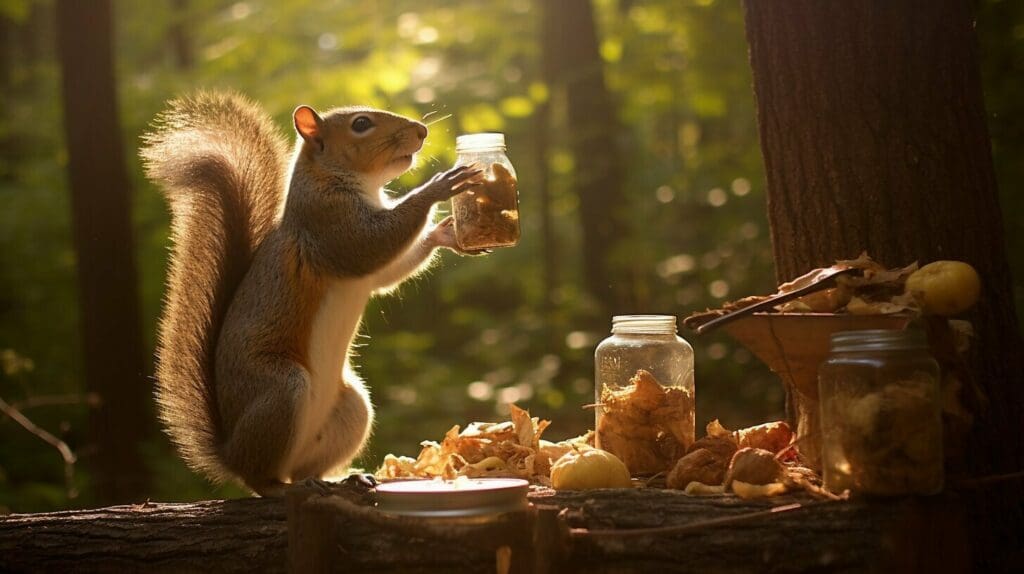
Overall, while peanut butter can be a tasty snack for squirrels, it’s important to consider the potential risks and take precautions when feeding it to them. There are many other natural foods that are safe and healthy for squirrels, so it’s important to prioritize a balanced diet for their overall health and wellbeing.
Alternatives to Peanut Butter for Squirrels
While peanut butter can be a tasty treat for squirrels, it’s important to remember that it should only be offered in moderation. In order to ensure that squirrels receive proper nutrition and maintain good health, it’s crucial to provide a balanced diet that mimics their natural food sources.
Fortunately, there are many safe and healthy foods that squirrels can enjoy. Nuts are a great source of protein and healthy fats, and some popular options include almonds, hazelnuts, and walnuts. Seeds such as sunflower seeds and pumpkin seeds are also great choices.
| Types of Fruits | Examples |
|---|---|
| Berries | Blueberries, raspberries, strawberries |
| Fruits with pits/seeds | Apples, peaches, plums |
| Other fruits | Bananas, grapes, melons |
Fruits, such as berries and apples, can provide important vitamins and minerals to squirrels. Vegetables, like carrots and sweet potatoes, are also rich in nutrients and can be a tasty addition to their diet.
It’s important to note that when offering new foods to squirrels, it’s best to introduce them gradually to avoid upsetting their digestive system. Additionally, it’s crucial to avoid any foods that are high in salt, sugar, or preservatives, as these can be harmful to squirrels.
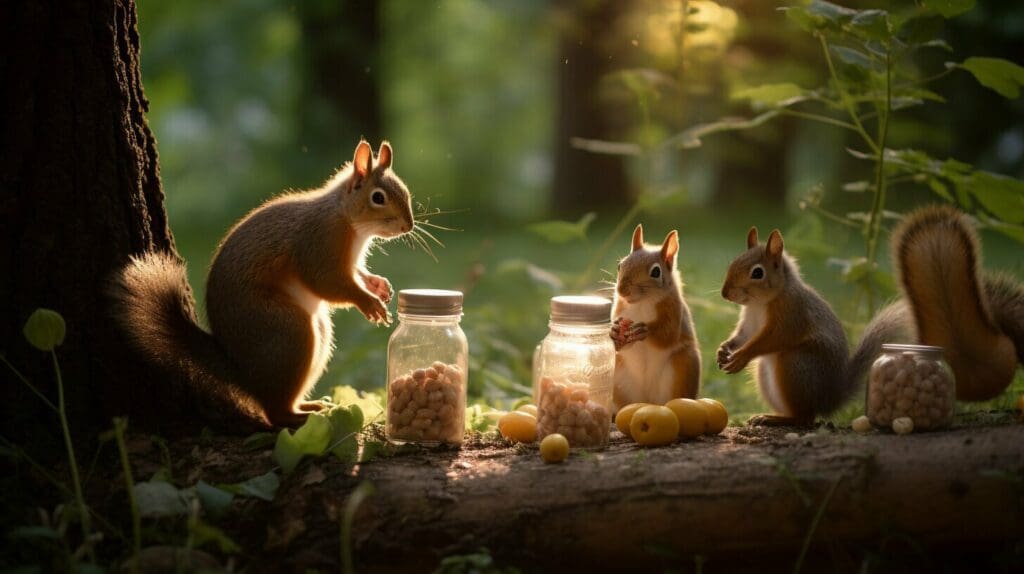
Overall, while peanut butter can be a fun and tasty addition to a squirrel’s diet, it’s important to prioritize natural and balanced foods to ensure their health and well-being.
Conclusion
In summary, while peanut butter may be a tempting snack for squirrels, it is important to remember that they have specific dietary needs. Squirrels typically consume nuts, seeds, fruits, and vegetables, and a balanced diet is crucial for their health. While peanut butter can be a treat or occasional supplement to their regular diet, it is important to offer it in moderation and without additives like sugar or salt.
Additionally, there are some potential risks associated with feeding squirrels peanut butter, including the risk of obesity, digestive issues, and potential allergies. Therefore, it is crucial to prioritize a natural and healthy diet for squirrels, and consult with wildlife experts or local authorities for specific guidelines on feeding wild squirrels.
There are plenty of alternative food options that are safe and healthy for squirrels, such as nuts, seeds, fruits, and vegetables. By providing a varied and natural diet that mimics their natural eating habits, we can ensure the overall health and wellbeing of squirrels in our neighborhoods.
FAQ
Q: Can squirrels eat peanut butter?
A: Yes, squirrels can eat peanut butter. However, it should be given in moderation as part of a balanced diet.
Q: Is peanut butter safe for squirrels?
A: Peanut butter can be safe for squirrels when given in moderation. It is important to avoid adding sugar or salt to it.
Q: What are the benefits of peanut butter for squirrels?
A: Peanut butter can provide squirrels with high energy and essential nutrients. It can be given as a treat or occasional supplement to their regular diet.
Q: What are the risks and precautions of feeding squirrels peanut butter?
A: Feeding squirrels too much peanut butter can lead to obesity and digestive issues. It is important to avoid additives and introduce it gradually into their diet.
Q: Are there alternatives to peanut butter for squirrels?
A: Yes, there are several safe and healthy alternatives to peanut butter for squirrels, such as nuts, seeds, fruits, and vegetables.
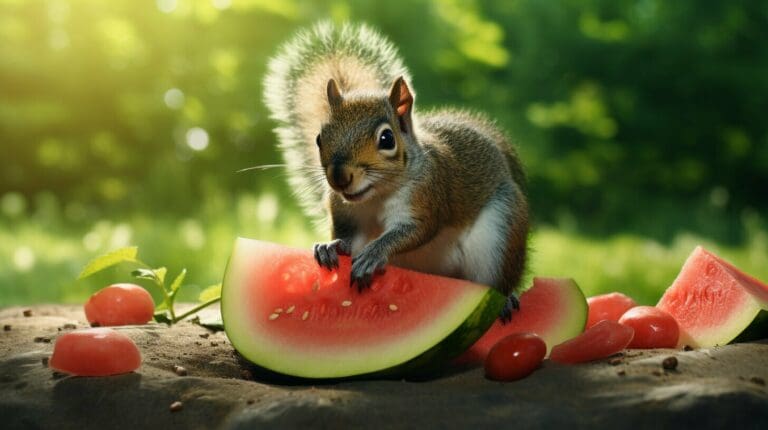
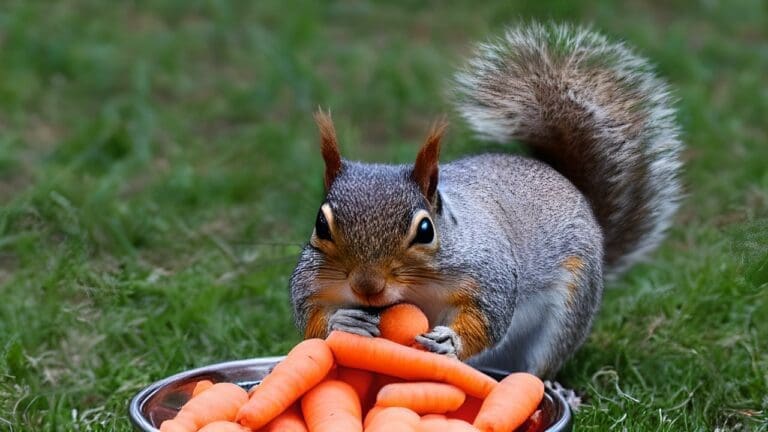
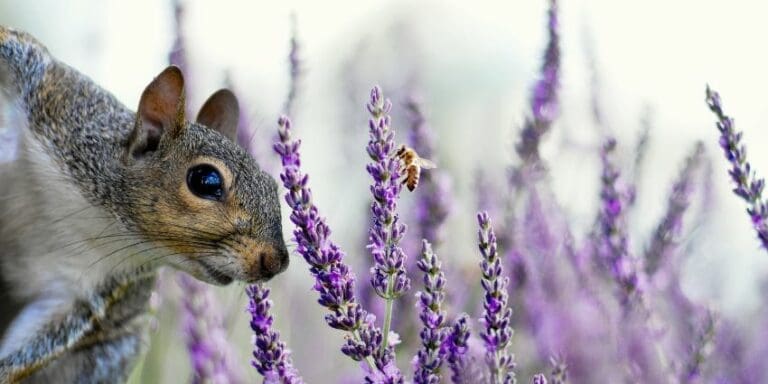
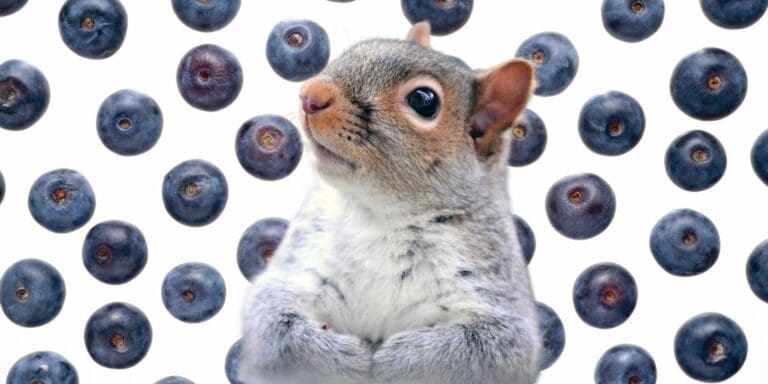
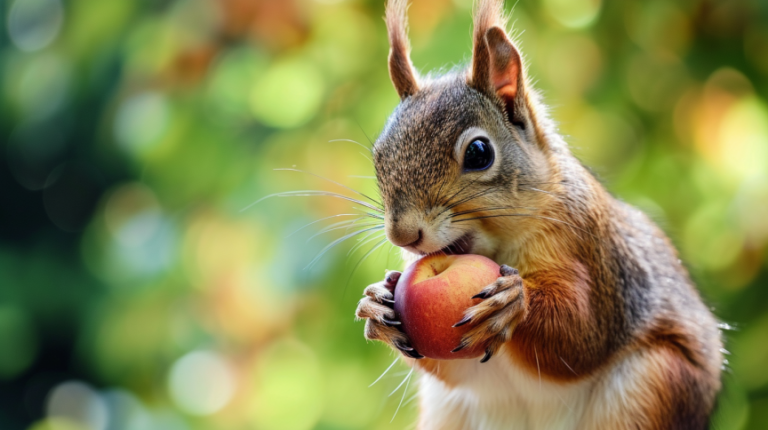
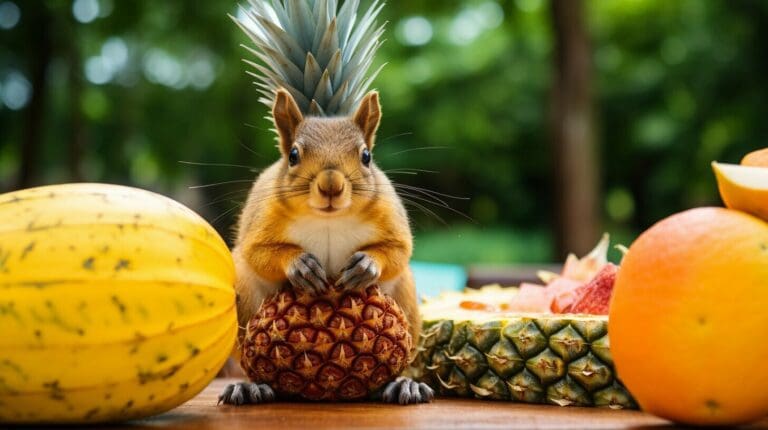
Hi owner,
I am highly interested in buying your website
Do you want to sell it at a proper price?
Please let me know
Thank you
[email protected]